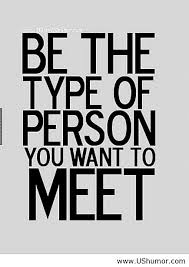
Attitude , Perceptions and self disclosure
Attitudes are evaluative statements or learned pre-dispositions to respond to an object,
person or an idea in a favorable or unfavorable way. Attitudes are narrow in scope. They
can vary from situation to situation. Strong attitudes can have an impact on professional
and personal relationship. Our attitude can determine whether we think positively and take
control of a situation or think negatively and feel helpless to change or respond to a
situation. Our attitude is an important component of our ability to be productive at work.
Our attitudes can influence people around us. Being aware of our own attitudes and
making choices about which attitude to display to others is very important to us as
individuals or as managers. Our attitude can affect our behaviour as well as our interaction
with others. Our friends, significant others, family members, co-workers and others are
definitely influenced by our thought and feelings towards situations. As managers it is also
important to recognize that our employees are affected by the attitudes we display towards
them and towards the work that needs to get done. A manager’s attitude is a large factor in
how people feel about their jobs. If a manager is upbeat most of the time and supportive of
his or her colleagues, employees will generally respond well and work hard to produce the
desired results. On the other hand if a manager is pessimistic and belittling towards his or
her employees, staff morale will suffer and ultimately so will the expected outcomes.
Perceptions: Perception describes the process by which individuals gather sensory
information and assign meaning to it. When we encounter a person or situation, we use our
senses to absorb various inputs. Next our brains select aspects from stored information in
order to process and organize these inputs. Finally our brains interpret and evaluate the
person or situation. Individual perception may not always be consistent with reality; it is
only perceiver’s interpretation of reality. Our perceptions are influenced by many factors,
such as our culture, environment, heredity, the media, peers, past experiences, intelligence,
needs, emotions, attitudes and values. Perception can be the result of multiple causality. As
human beings we tend to form perceptions based on our biases. If we are not aware of our
biases and don’t check our understanding with others, we might miss out on important
information and situations by relying on distorted perceptions. Some of the more common
filters are stereotyping, selective perception, projection expectation and interest.
Other’s Perceptions about us is also viewed to be important, as we can understand how we
are shaped by others opinions of us. This concept is referred to as social mirroring. By
seeing ourselves through others eyes we can learn about our strengths and also about areas
in which we can improve. Learning to read accurately how others see us enhances our
“self-maps” our images and judgments of our self.
· Self-disclosure: Another means of self-awareness is through self disclosure-sharing your thoughts,
feelings and ideas with others without self-deception, without distortion. Talking to others allows
to share our feelings and responses. Self-disclosure is a key factor in improving self-awareness;
we must disclose information and interact with others to further clarify our perceptions.
· Diverse Experiences: Another way of increasing self-awareness is through acquiring multiple
experiences in diverse situations and with diverse others. As we encounter new situations, we use
skills and acquire new ones, meet people and develop friendships, see new places and learn first
hand about things we might have only read about. Being open to experiences broadens our
horizons. It helps us to see ourselves in a new light while giving us new information about
ourselves and our ability to interact with the world. This boosts our confidence level and
encourages us to reach out to further our experiences even more.


